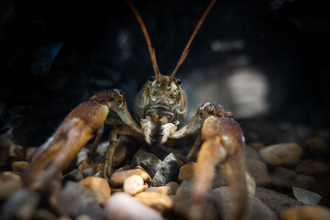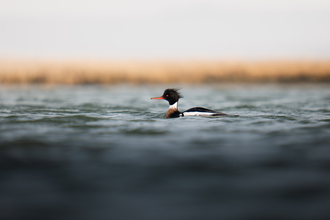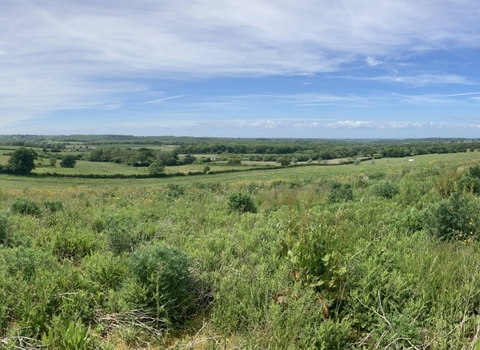Save our Chalk Streams
Currently, only 11 out of 220 British chalk streams have any legal protections, and even these fall short of the measures needed to defend these rivers.
The Government have a valuable opportunity to stand up for our chalk streams. We are calling on them to introduce specific legal protections in planning for all of our chalk streams, to protect them from development-related harm.
To grant protections for chalk streams locally, we are campaigning for local councils to raise Rights of the River motions in full council. The Rights of the River framework recognises that rivers have inherent rights, such as the right to flow, remain free from pollution, and support native biodiversity.
If you are local to Basingstoke, join us at a drop-in event on the 24th of April, between 6-8pm at The Orchard to give your views and shape a motion for the River Loddon and River Whitewater.
Our chalk streams need protecting
England's chalk streams are one of the rarest habitats on earth! Their crystal-clear waters are home for salmon, water voles, white-clawed crayfish and kingfishers, making them our equivalent to the Great Barrier Reef or the Amazon Rainforest. A truly special habitat that we are so lucky to enjoy.
Yet many of our chalk stream rivers are now polluted, dirty and choked by pollution, threatening the wildlife that calls them home and the people that rely on them for their wellbeing. The Government must introduce specific protections for all chalk streams in their planning reforms, to ensure these unique habitats are conserved and put into recovery for future generations.
Our key asks for Government
By granting chalk streams a better protection in planning, we can protect these unique rivers from the direct and indirect harms associated with new development. We are calling on the Government to:
-
Define chalk streams as irreplaceable habitats
-
Introduce 50-100 metre buffer zones along the riparian corridor
-
Mandate Local Planning Authorities to take account of implications for water resources and sewerage systems of major housing developments in their Local Plans and proposal reviews
-
Raise standards for water efficiency within water-stressed chalk catchments to a minimum of 90 litres per person per day in new developments
What is Hampshire & Isle of Wight Wildlife Trust doing?
March 2025-present
We are working alongside other Wildlife Trusts and nature charities to develop a chalk streams amendment to the Planning & Infrastructure Bill. This has the potential to grant chalk streams much-needed protections in planning.
Make your voice heard! Email your MP and ask them to support the amendment.
See the amendment, tabled by Chris Hinchliff MP here: https://publications.parliament.uk/pa/bills/cbill/59-01/0196/amend/planning_rm_pbc_0325.pdf
February 2025
We contacted all of our Councillors across Hampshire & the Isle of Wight, asking them to sign a powerful open letter to Rt Hon Angela Rayner MP and Rt Hon Steve Reed OBE MP
Read our letter to Government: Local councillors calling for chalk stream protections.pdf
November 2024
We authored an open letter to Deputy Prime Minister and Secretary of State for Housing, Communities and Local Government The Rt Hon Angela Rayner MP
Read our letter to Government: Chalk streams open letter 2024.pdf
September 2024
Over 700 people supported our call to protect chalk streams through planning and the National Planning Policy Framework (NPPF). The consultation closed on the 24th September.
We need your help to Save our Chalk Streams!
Already told the Government to protect chalk streams? Contact us at campaigns@hiwwt.org.uk to discover more opportunities, or explore other ways you can take action today...
Write to your MP to help keep the issue on the agenda
If you are unsure about who your MP is, find out here.
Blogs & news

Saving Britain’s native crayfish
The white-clawed crayfish Austropotamobius pallipes is Britain’s only native crayfish. This small, olive-brown crustacean with pale…

Merganser mania
The red-breasted merganser is a striking and fascinating diving duck. It is recognisable by its distinctive shaggy crest, slender red…

Shelved recovery plan sparks outcry for chalk streams
215 local councillors demand urgent action to protect globally rare chalk streams
Learn more about the threats facing our rivers
FAQs
Why are chalk streams special?
With 85% of chalk streams in the world found in the south of England, these cool, fresh, oxygen-rich waters provide the perfect habitat for rare British species like water vole, southern chalk stream Atlantic salmon, brown trout, southern damselfly, water crowfoot and white-clawed crayfish.
With so few chalk streams existing globally they are truly one of the rarest habitats on the planet. They are also incredibly rich in life; home to more species of plants than any other English river and include species found nowhere else. They are England's equivalent to The Great Barrier Reef or the Amazon Rainforest, a special heritage and our responsibility
What are the main threats to our rivers and streams?
Our rivers are facing multiple pressures from pollution, over-abstraction, invasive species, and climate change. Pollution from agriculture and sewage is causing algal blooms that suffocate life in the water. Over-abstraction reduces the flow and level of water in rivers, affecting wildlife and increasing the risk of droughts. Invasive species can outcompete or harm native species, disrupting the balance of the ecosystem. Climate change can cause more extreme weather events, such as floods and droughts, that damage river habitats and wildlife.
Do any chalk streams currently have any legal protections?
Currently only 11 out of 220 British chalk streams have any legal protections as a Site of Special Scientific Interest (SSSI). These are the Hampshire Test, the Somerset Frome, Dorset Bere Stream, Wiltshire and Berkshire's Kennet, the Norfolk Nar, Yorkshire’s Hull headwaters and Greater London's Crane.
Worse still, only 4 are protected fully at the highest level as a Special Area of Conservation (SAC). These are the Wiltshire Avon, Hampshire Itchen, Norfolk Wensum and Berkshire Lambourn.
None of our UK Rivers, including chalk streams, are in good ecological health. Despite even these very limited protections, our chalk streams suffer from chronic pollution issues like all other rivers in the UK. Status as an SSSI or SAC does not provide the bespoke, catchment-wide protection that chalk streams need to truly recover as these fragile habitats are heavily influenced by activities across their catchments, meaning any protection needs to be wide-reaching and specific to chalk streams.
This patchwork of limited protections show we need a bespoke protection specifically designed to ensure the health of all our chalk streams across the country.
How will new legal protections help our chalk streams?
We are demanding a new protections in planning to give chalk streams a chance to recover. These must protect them from the direct harms associated with new development, as well as indirect pressures like wastewater pollution. We are calling for bespoke protection for our chalk streams, as outlined by the CaBA Chalk Stream Restoration Strategy.
This protection must:
-
Introduce a 50-100 metre buffer as recommended by Natural England.
-
Add specific protections for chalk streams and their catchments more clearly and consistently as ‘irreplaceable habitats’, alongside ancient woodland, with stronger wording to specially protect chalk streams throughout national planning policy guidelines.
-
Encourage parallel investment in water supply and treatment infrastructure as a condition of planning approval.
Why do we need nature-based solutions?
We need nature more than ever. At the Trust we work with nature to help restore and replenish our local environments and provide benefits to people.
In a changing climate, drought and flood events are becoming an increasing occurrence, and are exacerbated by ageing water infrastructure and increased population. When implemented well, nature-based solutions can be used alongside more carbon-intensive and expensive grey infrastructure not just to reduce the risk and impact of floods and drought, but to generate additional benefits including improved water quality, biodiversity, and community health and wellbeing. One example of a nature-based solution to tackle flood events is Natural Flood Management which uses nature, including wetlands, beaver dams or woodlands, to slow the flow of water, reducing the chance of flash flooding, as well as increasing water storage throughout the landscape. We believe that nature-based solutions can be a cost-effective way to build resilience to key challenges we are facing, such as flooding or droughts. Nature-based solutions also provide numerous other benefits to people and nature in the process, such as carbon storage, cleaner water and health and wellbeing benefits.
How do you work with water companies?
Water and sewage utilities are the single largest players in the UK water sector. They have some of the largest impacts on the quantity and quality of water in rivers through the abstraction and discharge of treated and untreated wastewater. They control important engineered infrastructure impacting rivers, and (almost) every household and business are connected to them as paying customers for water supply and/or sewage.
Given the scale of operation and impact of water companies on rivers, The Trust needs to work with them at a strategic level to accelerate the recovery of our rivers, including our chalk streams. Any system for solving the complex problems facing our rivers will have to involve water companies as part of the solution.
Currently, the Trust works directly with water companies in the following ways:
-
We manage land that water companies own, delivering amazing places for people and nature.
-
We work in partnership with them on projects, such as our flagship rivers programme Watercress and Winterbournes which brings together 16 partners including Southern Water.
-
We are funded by them to deliver nature-based solutions to improve our rivers and their catchments.
-
We are part of boards and partnerships alongside water companies, including Catchment Partnerships and the Hampshire & Isle of Wight Local Nature Partnership.
But we also play a role in holding water companies to account for their impacts. We engage with them at a strategic level to push for change and respond to their consultations, including the recent Draft Water Resource Management Plans and Water Resources South East Regional Plans. We campaign against water companies’ poor decisions, for example, the previous plans for a desalination plant on the Solent. We also support people and our Team Wilder groups to take action to revive our rivers, including taking action to hold water companies accountable.
What else is the Trust already doing to restore our rivers?

Wilder Duxmore Farm 2022 © Agatha Thompson
Nature based solutions
The Trust is using nature-based solutions to restore and revitalise rivers, improving water quality, reducing pollution, and enhancing biodiversity. Through habitat restoration, rewilding, and natural flood management techniques, we are creating healthier ecosystems that benefit wildlife, people, and the environment.
White-clawed Crayfish © Ben Rushbrook
Habitat Restoration and reintroductions
Habitat restoration and species reintroductions, such as our White-Clawed Crayfish work, are helping improve river ecosystems. By restoring degraded habitats and reintroducing native species, we can enhance biodiversity, improving water quality, and restoring the natural balance of river ecosystems.
People walking by a river © Matthew Roberts
Watercress and Winterbournes
Watercress and Winterbournes is a Landscape Partnership Scheme that is protecting, enhancing, and celebrating seven chalk streams, with support from the National Lottery Heritage Fund. The 16 partner organisations are empowering local communities to restore these special waters, highlight their rich cultural heritage, and safeguard their future.

Campaigning
Our campaigning efforts are helping to protect and restore rivers. Through advocacy, education, and public engagement, we raise awareness, drive policy changes, and empower communities to take action for river conservation.






